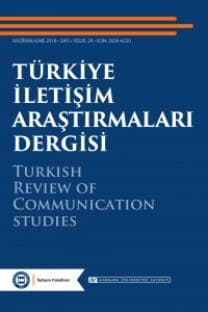Yaşamın Çevrimiçi Okulu: Alain de Botton'un ‘The School of Life’ Oluşumunun Strateji ve Taktik Olarak Analizi
popüler kültür, Michel de Certeau, Michel Foucault, strateji, taktik, the school of life
From Life to Its Online School: An Analysis of Alain de Botton’s ‘The School of Life’ as Strategy and Tactic
popular culture, Michel de Certeau, Michel Foucault, strategy, tactic, the school of life,
___
- Berger, A. A. (2004). Media analysis techniques. London: SAGE Publ.
- Bourdieu, P. (1977). Outline of a theory of practice. Cambridge: Cambridge University Press.
- Certeau, M. (1984). The practice of everyday life. Berkeley: University of California Press.
- Featherstone, M. (2007). Consumer culture and postmodernism. London: Sage.
- Foucault, M. (1977). Discipline and punish. London: Penguin Books.
- Foucault, M. (1978). The history of sexuality. Vol. 1: An introduction. New York: Random House.
- Foucault, M. (1980). Power/knowledge. Hertfordshire: Harvester Wheatsheaf.
- Held, D. (1990). Introduction to critical theory: Horkheimer to Habermas. Cambridge: Polity Press.
- Horkheimer, M. (1982). Critical theory. New York: Seabury Press.
- Horkheimer, M. and Adorno, T. W. (1972). Dialectic of enlightenment. New York: Herder and Herder.
- Kellner, D. (n.d.). Communications vs. cultural studies: Overcoming the divide. Retrieved from: https://www.uta.edu/huma/illuminations/kell4.htm.
- Lefebvre, H. (1991). The production of space. Oxford, OX, UK: Blackwell.
- Macdonald, D. (1957). A theory of mass culture. Diogenes, 1(3), 1-17.
- Matousek, M. (2016). The school of life: An interview with Alain de Botton. Retrieved from: https://www.huffingtonpost.com/mark-matousek/the-school-of-life-an- int_b_9916166.html.
- McRobbie, A. (1994). Postmodernism and popular culture. London: Routledge.
- Mitchell, J. P. (2007). A fourth critique of the enlightenment: Michel de Certeau and the ethnography of subjectivity. Social Anthropology, 15(1), 89-106.
- Scott, J. (1985). Weapons of the weak. Everyday forms of peasant resistance. New Haven: Yale University Press.
- Scott, J. C. (1989). Everyday forms of resistance. Copenhagen Papers, 4, 33-62.
- Scott, J. C. (1990). Domination and the arts of resistance. Hidden Transcripts. Yale University Press.
- Singletary, M. (1994). Mass communication research: contemporary methods and applications. New York & London: Longman.
- Strauss, A. and Corbin, J. (1990). Basics of qualitative research: grounded theory procedures and techniques. Newbury Park, CA: Sage Publications.
- Strinati, D. (2004). An introduction to theories of popular culture. London: Routledge.
- The School of Life. (2018, May 8). How the modern world makes us mentally ill. [Video file]. Retrieved from: https://www.youtube.com/watch?v=yO0v_JqxFmQ&t=23s.
- The School of Life. (2017, August 22). What is emotional intelligence? [Video file]. Retrieved from: https://www.youtube.com/watch?v=LgUCyWhJf6s.
- The School of Life. (2014, December 8). The dangers of the Internet. [Video file]. Retrieved from: https://www.youtube.com/watch?v=uquRzrcwA18&t=209s.
- The School of Life. (n.d.a). Retrieved from: https://www.theschooloflife.com/about-us/.
- The School of Life. (n.d.b). Retrieved from: https://www.theschooloflife.com/shop/15- minute-timer/.
- The School of Life. (n.d.c). Retrieved from: https://www.theschooloflife.com/shop/career-crisis-prompt-cards/.
- Başlangıç: 1992
- Yayıncı: Marmara Üniversitesi
Uluslararası Öğrencilerin Kültürleşme Stresi Düzeylerine İlişkin Nicel Bir Araştırma
Mustafa AKDAĞ, Ömer Faruk KOÇAK
Coca-Cola Reklamlarındaki Kolonyal ve Postkolonyal Ögelerin Göstergebilimsel Analizi
İş Güvenliği İletişim Mesajlarında Korku Çekiciliğinin Kullanımı: Deneysel Bir Çalışma
Selin TÜRKEL, Sema MİSCİ KİP, Feyza Elif YASDIMAN
Yeni Medya Gazeteciliğinde Haberlerin Insta-değerliliği: Instagram’da Haber Değerini Anlamak
Ilgar SEYIDOV, Beris ARTAN ÖZORAN
Yeni Medyada Hikayeleştirme Kullanımı Bağlamında Marka Sadakati
Betül KILIÇ TARAN, Nurhan Zeynep BABÜR TOSUN
Gökçen KARANFİL, A. Özgür GÜRSOY
Reklamlarda Emoji Kullanımı: Emojilerin Reklam Mesajı Hatırlanılırlığına Etkisi
Haluk AKARSU, Emrah GÜLMEZ, Mesude Canan ÖZTÜRK
Yerli Çocuk Çizgi Filmlerinde İdeolojik Bir Söylem Olarak Yaşlılık: TRT Çocuk Örneği
Burcu DABAK ÖZDEMİR, Ürün YILDIRAN ÖNK
İletişim Biliminin Oluşumunda Pozitivist Epistemolojinin Rolü
